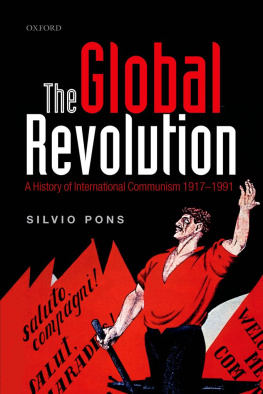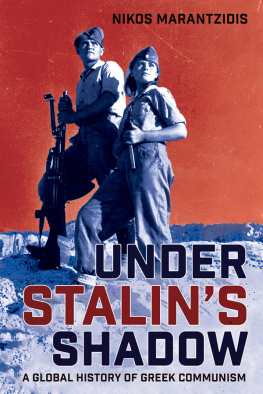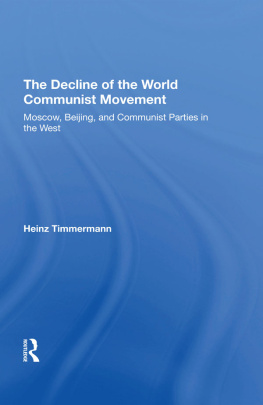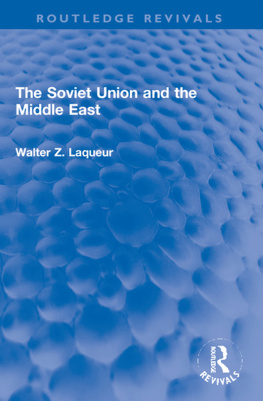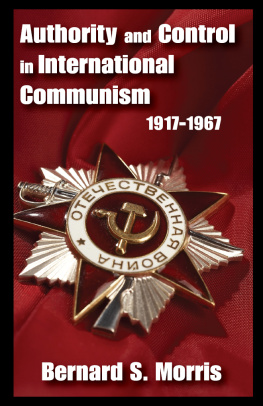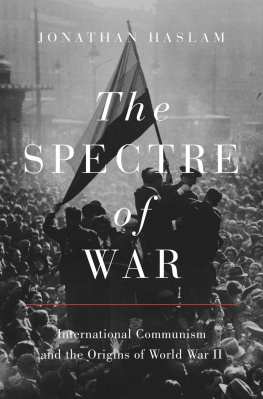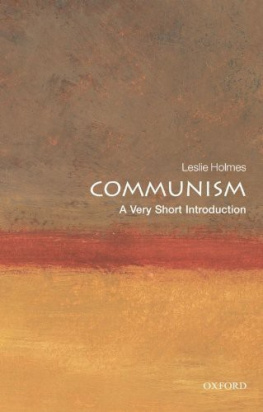OXFORD STUDIES
IN MODERN EUROPEAN HISTORY
General Editors
SIMON DIXON, MARK MAZOWER,
and
JAMES RETALLACK

Great Clarendon Street, Oxford, OX2 6DP, United Kingdom
Oxford University Press is a department of the University of Oxford.
It furthers the Universitys objective of excellence in research, scholarship, and education by publishing worldwide. Oxford is a registered trade mark of Oxford University Press in the UK and in certain other countries
First published in Italian as Stato e Rivoluzione Giulio Einaudi editore s.p.a., Torino 2012.
English translation Oxford University Press 2014
The moral rights of the author have been asserted
First Edition published in 2014
Impression: 1
All rights reserved. No part of this publication may be reproduced, stored in a retrieval system, or transmitted, in any form or by any means, without the prior permission in writing of Oxford University Press, or as expressly permitted by law, by licence or under terms agreed with the appropriate reprographics rights organization. Enquiries concerning reproduction outside the scope of the above should be sent to the Rights Department, Oxford University Press, at the address above
You must not circulate this work in any other form and you must impose this same condition on any acquirer
Published in the United States of America by Oxford University Press
198 Madison Avenue, New York, NY 10016, United States of America
British Library Cataloguing in Publication Data
Data available
Library of Congress Control Number: 2014940483
ISBN 9780199657629
Links to third party websites are provided by Oxford in good faith and for information only. Oxford disclaims any responsibility for the materials contained in any third party website referenced in this work.
The publication of this book was assisted by a grant made by the Fondazione Istituto Gramsci.
eISBN 9780191054105
For Chiara
Contents
ARCHIVES
| APCF | Archive du Parti communiste franais [Archive of the French Communist Party] |
| APCI | Archivio del partito comunista italiano [Archive of the Italian Communist Party] |
| AVPRF | Arkhiv Vneshnei Politiki Rossiiskoy Federatsii [Foreign Policy Archive of the Russian Federation) |
| RGANI | Rossiiskii Gosudarstvennyi Arkhiv Noveishei Istorii [Russian State Archive of Contemporary History] |
| RGASPI | Rossiiskii Gosudarstvennyi Arkhiv Sotsialno-Politicheskoy Istorii [Russian State Archive of Social and Political History] |
| SAPMO | Stiftung Archiv der Parteien und Massenorganisationen der DDR im Bundesarchiv [Foundation Archives of Parties and Mass Organizations of the GDR in the Federal Archives] |
DOCUMENT COLLECTIONS
| KIMR | Komintern i ideya mirovoy revoliutsii: dokumenty [The Comintern and the Idea of World Revolution: Documents], ed. J. S. Drabkin (Moscow: Nauka, 1998) |
| KVMV | Komintern i Vtoraya Mirovaya Voyna [The Comintern and the Second World War], ed. N. S. Lebedeva and M. M. Narinskii (2 vols, Moscow: Pamyatniki Istoricheskoy Misly, 1994; 1998) |
| PBKI | PolitburoCK Rkp(b)Vkp(b) i Komintern 19191943: dokumenty [The Central Committee Politburo of the Rkp(b)Vkp(b) and the Comintern 19191943: documents], ed. G. M. Adibekov and K. K. Shirinya (Moscow: Rosspen, 2004) |
| Prezidium | Prezidium TsK KPSS 19541964. Chernovye protokolnye zapisi zasedanii. Stenogrammy. Postanovleniya [The Presidium of the Central Committee of the Communist Party of the Soviet Union, 19541964] (3 vols, Moscow: Rosspen, 20038) |
| SFVE | Sovetskii faktor v Vostochnoy Evrope 19441953: dokumenty [The Soviet Factor in Eastern Europe: Documents](2 vols, Moscow: Rosspen, 1999, 2002) |
| VEDRA | Vostochnaya Evropa v dokumentakh rossiiskikh arkhivov 19441953 [Eastern Europe in the Documents of the Russian Archives] (2 vols, Moscow/Novosibirsk: Sibirskii Khronograf, 19978) |
INSTITUTIONS AND POLITICAL PARTIES
| CCP | Chinese Communist Party |
| Cheka | Special Commission |
| Comecon | Council for Mutual Economic Assistance |
| Cominform | Communist Information Bureau |
| Comintern | Communist International |
| CPGB | Communist Party of Great Britain |
| CPSU | Communist Party of the Soviet Union |
| CPUSA | Communist Party of the United States of America |
| CSCE | Conference on Security and Cooperation in Europe |
| ECCI | Executive Committee of the Communist International |
| Gulag | Main Camp Administration |
| ICP | Indonesian Communist Party |
| KGB | Committee for State Security |
| KKE | Kommunistiko Komma Ellados [Greek Communist Party] |
| KPD | Kommunistische Partei Deutschlands [German Communist Party] |
| KS | Komunistick Strana eskoslovensk [Czechoslovak Communist Party] |
| MPLA | Peoples Movement for the Liberation of Angola |
| Narkomindel | Peoples Commissariat for External Affairs |
| NATO | North Atlantic Treaty Organization |
| NEP | New Economic Policy |
| NKVD | Peoples Commissariat for Internal Affairs |
| OGPU | Joint State Political Directorate |
| PCE | Partido comunista de Espaa [Spanish Communist Party] |
| PCF | Parti communiste franais [French Communist Party] |
| PCI | Partito comunista italiano [Italian Communist Party] |
| PCP | Partido comunista portugus [Portuguese Communist Party] |
| Politburo | Political Office |
| RCP(b) | Russian Communist Party (Bolshevik) |
| SED | Socialistische Einheitspartei Deutschlands [United Socialist Party of Germany] |
| SPD | Sozial-Demokratische Partei Deutschlands [Social Democratic Party of Germany] |
During the twentieth century, communism left its mark on the life, death, hopes, fears, dreams, nightmares, identity, and choices of a large part of humanity. It is not easy to find a single significant aspect of world history in the past century that was not in some way connected to it and did not come under its influence. Communism was many things together: a reality and a mythology, a state system and movement of parties, a closed elite and a mass politics, a progressive ideology and an imperial dominion, a project for a just society and an experiment on humanity, a pacifist rhetoric and a strategy of civil war, a liberating utopia and a system of concentration camps, an antagonist of world order and a form of anti-capitalist modernity. Communists were victims of dictatorial regimes and the creators of police states. Protagonists in social struggles, national liberation movements, and campaigns for citizens rights, they invariably founded totalitarian, oppressive, and liberticidal regimes. Their dogmatism, discipline, leadership cults, and organization were proverbial, as was their adaptability to very different social, political, and cultural contexts. The attraction or repulsion evoked by the states, parties, and societies that grew out of the communist experience for a long time defined individual lives, intellectual orientations, and collective psychology.

